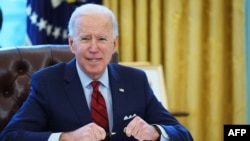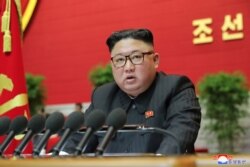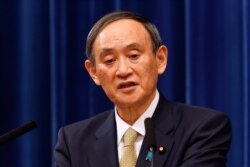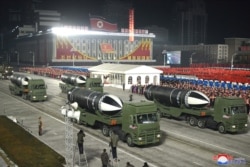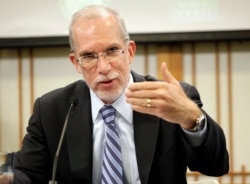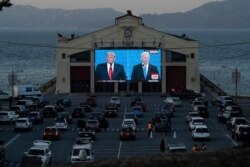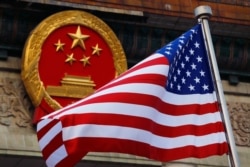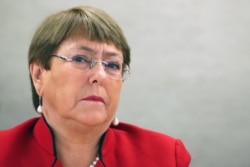The Biden administration is likely to reverse the Trump administration’s North Korea policies, but experts see little hope for significant progress toward denuclearization in the face of Pyongyang’s determination to strengthen its nuclear arsenal.
As the new Biden administration gears up to formulate policies toward North Korea, experts think the administration will probably return to the incremental approach to denuclearization that was the norm before former President Donald Trump’s term in office.
The U.S. traditionally favored a step-by-step approach where Washington would grant series of small concessions or rewards such as sanctions relief or economic incentives as Pyongyang takes small steps along the trajectory of long-term denuclearization.
“I think the Biden administration is likely to seek [the] incremental dismantlement of North Korea’s nuclear program in exchange for incremental sanctions relief,” said Gary Samore, who served as the White House coordinator for arms control and weapons of mass destruction during the Obama administration.
“As we saw at the Hanoi summit, Kim Jong Un is not willing to accept a big deal for complete denuclearization in exchange for complete sanctions relief,” said Samore, referring to North Korea’s leader.
At the Hanoi Summit in February 2019, Trump proposed a big deal to Kim.
He demanded the complete dismantlement of North Korea’s nuclear arsenal in exchange for the relief of sanctions that were placed on the regime to choke off its overseas income used for financing its nuclear weapons program.
Kim rejected the proposition, the summit ended without a deal, and subsequent working-level talks in Stockholm in October also broke down without progress toward a deal.
Denuclearization affirmed
After President Joe Biden was sworn into office on January 20, he affirmed the need for complete denuclearization of the Korean Peninsula during his call with Japanese Prime Minister Yoshihide Suga on January 27.
On Monday, Secretary of State Antony Blinken told NBC News that the Biden administration plans to use additional sanctions in coordination with U.S. allies and unspecified diplomatic incentives to denuclearize North Korea.
According to Evans Revere, a former U.S. State Department official with extensive experience negotiating with North Korea, whether Washington pursues a small step-by-step deal or a big one-shot deal might be irrelevant in the face of Pyongyang’s intent to continue expanding its nuclear weapons program.
“The days of a ‘small deal’ or a ‘big deal’ are almost certainly over,” said Revere.
“By Kim’s recitation of the list of nuclear weapons and ballistic missile technology he intends to develop, and by every other signal coming from Pyongyang in recent years, North Korea is not going to denuclearize [out] of its own free will,” Revere continued. “In Pyongyang’s view, the game has now changed.”
Quoting Kim’s remarks during the Eighth Party Congress of the Workers’ Party of Korea held over eight days from January 5 to 12, Revere said Kim “stressed that becoming a nuclear weapons state has been [North Korea’s] ‘strategic and predominant goal.’”
As a show of force, North Korea unveiled what appeared to be new weapons through military parades held before the U.S. presidential election and after Congress certified Biden as president.
In a parade held in October, North Korea displayed what is believed to be its biggest ever intercontinental ballistic missiles (ICBM) that can reach the U.S.
During a parade held on January 14, North Korea spotlighted what seems to be a new type of submarine-launched missiles as well as other weapons showing it is bolstering its missile program.
In his first interview since defecting to South Korea more than a year ago, Ryu Hyeon-woo, North Korea’s former acting ambassador to Kuwait, told CNN on Sunday that “Kim Jong Un cannot denuclearize” because “North Korea’s nuclear power is directly linked to the stability of the regime.”
Working-level talks
Despite its unwillingness to denuclearize, Revere said, North Korea will negotiate with the U.S.
“North Korea is ready for a negotiation, but it will not be about denuclearization,” said Revere.
He added that Pyongyang’s negotiation aim is to persuade the Biden administration to accept North Korea as a nuclear weapons power and enter into arms control talks that could slow down its development of nuclear weapons and missiles.
Otherwise, Revere said, Pyongyang is likely to tell Washington it intends to continue down the path of becoming a more capable nuclear weapons state.
The Biden administration is likely to engage North Korea, “in principle,” at the working-level, at the senior, or at special envoy level, according to Revere.
Scott Snyder, director of the U.S.-Korea policy program at the Council on Foreign Relations, also thinks the Biden administration will engage North Korea through working-level talks before holding any summits.
“The Trump administration also sought working-level talks as a complement to top-down diplomacy, but I believe the Biden administration desires to reverse the order and wants to make progress in working-level talks in order to justify summitry,” said Snyder.
Trump preferred a top-down approach toward diplomacy where he prioritized meeting with Kim during two summits starting in June 2018 in Singapore rather than letting working-level talks lead up to summits.
Criticizing Trump’s top-down approach, Biden said during a pre-election debate with Trump in October that he would meet Kim but “on the condition that he would agree that he would be drawing down his nuclear capacity.”
Seeking Chinese cooperation on sanctions
Biden also said during the debate he would maintain pressure on China to hold North Korea in check.
Both the U.N. and the United States have accused China of helping North Korea defy sanctions.
Snyder said, “I believe the Biden administration will seek China’s cooperation in pursuit of North Korea’s denuclearization, but if China is not forthcoming and fails to implement sanctions and stop the facilitation of sanctions evasion, I believe the Biden administration will have no option other than the unilateral [sanctions] if it desires to effectively pressure North Korea.”
Relations between Washington and Beijing became increasingly tense during the last year of the Trump presidency. The Trump administration took a hardline stance with China over responsibility for COVID-19, autonomy for Hong Kong, and Taiwanese independence.
China responded with harsh rhetoric, retaliatory sanctions against the U.S., and offensive military postures near Taiwan.
On Thursday, China threatened that Taiwan’s “independence means war.” China claims Taiwan as its own territory despite Taiwan’s opposition. Washington has long recognized Beijing’s one China, two systems model for Taiwan, but on January 9, Pompeo lifted self-imposed U.S. restrictions on contacts between U.S. and Taiwan, prompting China to react.
Against this backdrop, Revere said, “Beijing is in no mood to ‘do the U.S. a favor’ by cooperating on North Korea because of the ongoing deterioration of U.S.-China relations” unless North Korea “does something that angers Beijing, such as a nuclear or long-range missile test.”
Return to human rights
In respect to North Korea’s human rights violations, Bruce Klingner, a senior researcher at the Heritage Foundation, said, “The Biden administration should return human rights to its North Korea policy and fill the North Korean human rights coordinator position that Trump left vacant.”
On Saturday, the Office of the U.N. High Commissioner for Human Rights, headed by Michelle Bachelet, issued a report urging the international community to refer North Koreans who are responsible for what it called crimes against humanity to the International Criminal Court or an ad hoc tribunal for possible trials.




